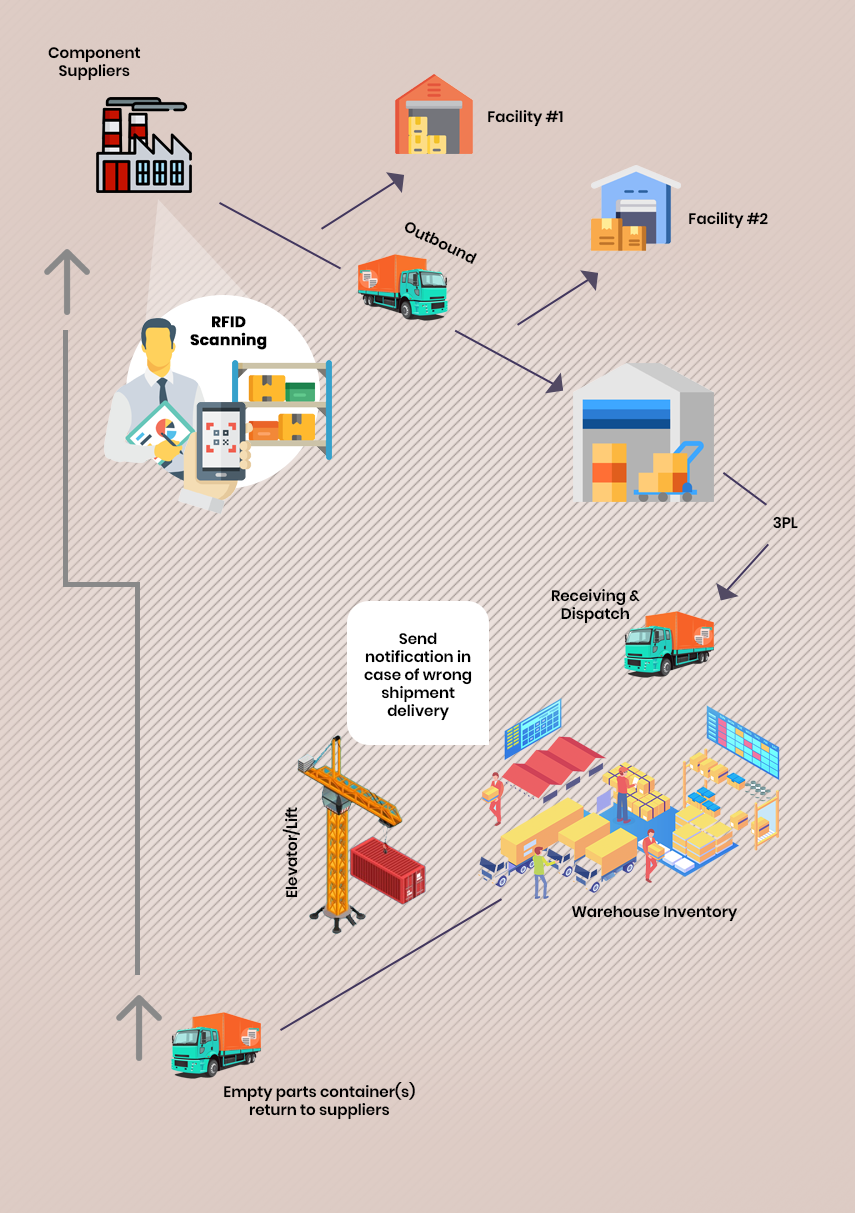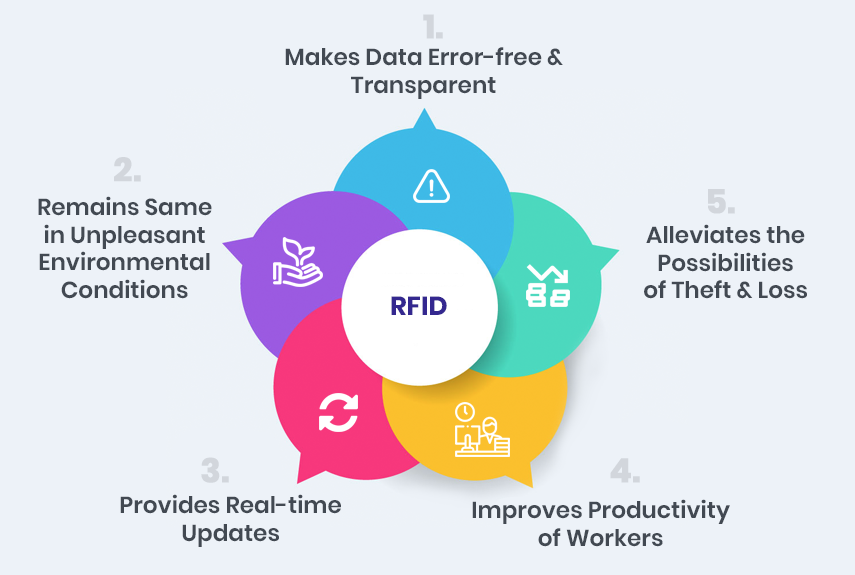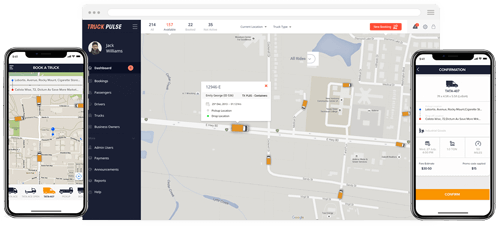Needless to say, technology is advancing in every sector across the world. And the logistics and supply chain management sector is not an exception. The more it advances, the need for humans in the supply chain reduces. One of the noteworthy advancements in technology is Radio Frequency Identification (RFID). Along with automation, RFID in supply chain management would bring a major transformation in performance and expenses. With RFID, the process of supply chain management becomes efficient and the involvement of humans in this process decreases.
RFID is a process of saving data and retrieving it through radio waves. An RFID tag includes a unique identifier that correlates with inventory database records.
So, are you still following the traditional inventory management methods for your logistics service? This post will change your mind. Go through this post till the end and you will get to know how RFID defines a profitable future for logistics and supply chain management.
RFID - What You Need to Know
RFID uses electromagnetic waves to identify and capture labels attached to objects and store the data for speedy and accurate operation. The purpose it serves is similar to barcodes. But unlike barcodes, RFID makes the process quicker, more convenient, and error-free.
As you already have got a brief idea about RFID, let’s have a look at how it works.
How RFID Works
In assistance with Automatic Identification and Data Capture (AIDC) technology, RFID uses radio waves and identify objects, amalgamate information about those objects, and store that information in database record without any human help.
This technology has grown a lot since its first application. It has not only been improved over the years but also the cost of implementing and utilizing it continues to minimize, making this technology more efficient and affordable.

An ideal RFID system has two main components - an RFID Tag & an RFID Reader
Let’s talk about these components and get a better understanding of how RFID works.
RFID Tag
An RFID tag includes an embedded transmitter and a receiver. The two components with which RFID tag perform fluently are - integrated circuit and antenna. With an integrated circuit, data storage and processing is possible. With the help of an antenna the signal being reception and transmission can be performed. There is also a non-volatile memory storage present in an RFID tag to sensor information and transmit it.
RFID Reader
An RFID reader has an important component -interrogator, aka a transceiver. It is useful for transmitting the encoded signals which activates the RFID tags.
Every item in the logistics and supply chain management process is attached with an RFID tag. The RFID reader, usually installed at the entry and exit point of a warehouse, registers the tag and updates the data stored in that warehouse’s computer system. The data collected helps in tracking the items in an error-free way. Also, it organizes all the items’ locations strategically. Moreover, the RFID system helps in selecting the items for the further distribution procedure. The installed reader scans the items that are ready to move out from the warehouse and collects data to update in real-time in the database record.
Application of RFID
From agriculture to jewelry business, defense to kiosks, laundry automation to library system, RFID has various major real-world applications in different sectors. Here, I will talk about its applications in logistics and supply chain management. RFID in this sector plays an important role as it improves the visibility from manufacturing through the supply chain and finally to the exit door of warehouses.
Three areas where the application of RFID is important for logistics business -
1 Inventory Management
In supply chain management the role of inventory management is important. From monitoring to administration, storage control, and ultimately selling a product - all these aspects are included in inventory management. Often it has been noticed that the inventory records and the actual amount of the items available for sale do not match. And such errors can lead to mismanagement in inventory. Thanks to RFID technology, this issue can be solved. RFID tags read through a product and reduce human error. Thus, there is no chance of mismatch or inaccuracy of any data management in inventory. Also, an RFID reader scans the code instantly during the inventory management process and thus the whole process becomes much faster.
2 Warehouse Management
In a warehouse, different types of products get stored and later distributed to the customers. To manage a warehouse seamlessly is quite a task. But with an RFID system, this can be done in a breeze. Using such a system you can automate the essential tasks related to receiving and shipping products. It also improves the efficiency of the process of identifying new items and their validation accurately. As a result, the supply chains can get good data flow than the time when everything in warehouses used to be managed by humans through traditional processes.
3 Retail Sector
To meet growing consumer demand, various retail companies have started using RFID technology. It makes a product’s visibility better in retail inventory and therefore both the control on inventory and the consumer experience get improved. This is extremely useful, especially in large retail stores where customers can search for the products they want. Another usefulness of RFID is it stores unique identification number for every product and thus a product’s identification is not overlapped with the other one’s. And finally, it makes a customer scan all products of a cart without picking any item. Dynamic pricing, theft minimization, and employee tracking can also be done efficiently with RFID.
Challenges of RFID in Supply Chain and Logistics Management
Excessive Cost
Implementing a successful RFID system can be a costly affair. The software and hardware needed for RFID cost a lot. Also, you cannot ignore the maintenance cost.
Lack of Understanding
Understanding the RFID technology properly is important to harness its maximum benefits. One needs to have a detailed idea about different tags and frequencies. It has been noticed that many companies fail to provide proper training to their employees about RFID due to a lack of in-house experts.
Technical Issues
There are some technical issues associated with implementation of RFID. During RFID tag or reader collisions, the system fails to work accurately. Also, the RFID system does not work well when it comes in contact with liquid and metal items.
Security Concern
As RFID is based on wireless networking, security concern is involved with this technology. Collecting data, transmitting it and storing it in database record - the entire process should be completely secured. It has been noticed that many RFID vendors face security issues while using this system.
Even though there are some challenges associated with the implementation of RFID, companies are still depending on this expensive option to barcodes simply because it is worth it.
Why?
RFID offers seamless logistics and supply chain management solutions to companies. Some of the great benefits of RFID for the logistics industry are as mentioned below:
Benefits of RFID in Logistics & Supply Chain Management

1 Makes Data Error-free & Transparent
Manually managing inventory is a time-consuming and tedious job. RFID makes the process automated, error-free and transparent. A good RFID scanner can scan an inventory room at once, track all the inventory easily.
2 Remains Same in Unpleasant Environmental Conditions
During unpleasant weather conditions, such as high humidity, drastic change in climate, etc. RFID system performs reliably. Even when someone roughly handles the system or it gets chemical exposure, it still can do its job properly.
3 Provides Real-time Updates
RFID system integrates with the wireless networking system and real-time inventory management system. As a result, you always stay updated with how many products you have in your warehouse. The RFID scanner installed in the door of a warehouse can deliver instant updates of products that come to and leave.
4 Improves Productivity of Workers
RFID technology reduces the need for manpower for locating items in supply chain management. The workers do not have to spend their energy on time-consuming procedures such as scanning every barcode, searching for lost items or counting amounts of inventory. This enables them to focus on other tasks and complete everything in a faster manner.
5 Alleviates the Possibilities of Theft & Loss
The asset tracking feature of an RFID system improves the visibility of every item in a warehouse. You get easy access to inventory. You can keep track of the items that are stored, distributed and restocked, no matter where those items are, in a supply chain. This kind of visibility helps you get updates whenever there is any item misplaced or lost. You can take actions accordingly to avoid loss of money and brand reputation.
Wrapping it up
This post is aimed to provide you a detailed idea about how RFID impacts the supply chain and logistics management. The technology has a promising future and thus you should implement this in your logistics business without making further delay.
Make your logistics and supply chain management process seamless and profitable with RFID.
Author's Bio




